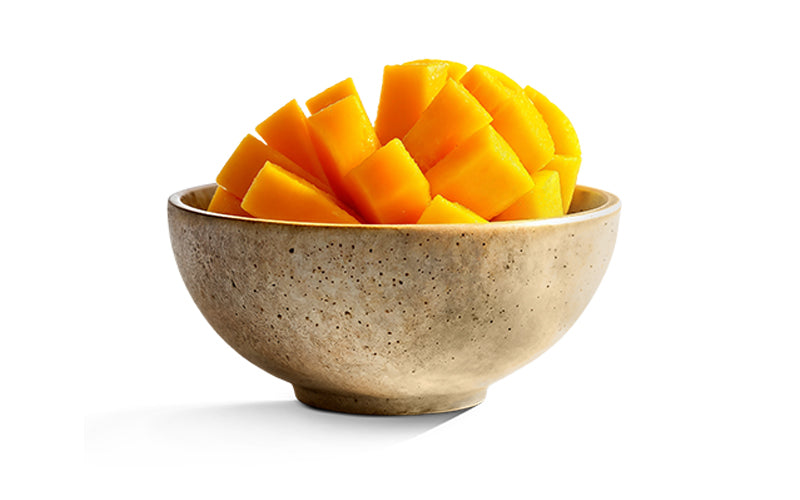It’s a hot afternoon. You’re slicing a juicy mango, and your dog is sitting nearby, staring at you with those hopeful eyes. That familiar look that says, “Are you going to share that with me?”
As a dog owner, you must have often found yourself wondering if your favorite snacks are safe to share with your furry friends. And when it comes to sweet, tropical fruits like mangoes, the answer isn’t as simple as a yes or no.
So, can dogs eat mangoes? Yes, they can, but with a few important conditions.
While mangoes are packed with nutrients and can offer several health benefits, they must be served properly to ensure your dog’s safety. In this blog, we’ll explore the benefits of mango for dogs, how much mango is safe, and when it’s best to avoid feeding mango to your pet.
Is Mango Good for Dogs?
Mangoes are not just delicious; they’re also packed with nutrients that can support your dog’s overall health. When given in moderation, mangoes can be a healthy treat for your dog. Here’s a breakdown of the key benefits:

1. A Vitamin Boost
Mangoes are rich in vitamins, which can help support various aspects of your dog’s health. Here’s a quick look at the benefits:
-
Vitamin A- Supports vision and immunity
-
Vitamin B6- Boosts energy and brain function
-
Vitamin C- Strengthens immunity and joints
-
Vitamin E- Promotes healthy skin and a shiny coat
These vitamins work together to keep your dog’s body functioning optimally and help them maintain good health.
2. Fiber for Healthy Digestion
Mangoes contain both soluble and insoluble fiber. Soluble fiber can help regulate your dog’s blood sugar and cholesterol levels, while insoluble fiber supports digestive health. The fiber in mangoes can promote smoother bowel movements, helping to avoid constipation and keep your dog’s digestive system in balance.
3. Potassium for Muscle Health
Mangoes are also a great source of potassium, which plays a vital role in muscle function and fluid balance. For active dogs, potassium helps maintain energy levels and ensures that muscles perform well, especially during physical activity.
4. Antioxidants for Cell Protection
Mangoes are rich in antioxidants, such as alpha and beta carotene, which help protect cells from damage caused by free radicals. These antioxidants can support longevity and general health, protecting against oxidative stress that can lead to aging and disease.
While mangoes offer numerous health benefits, it’s important to feed them properly to avoid any risks.
How to Safely Feed Mango to Your Dog
Mangoes are safe for dogs to eat in moderation, but there are some important guidelines to follow to ensure your dog’s safety:
1. Remove the Pit and Skin
One of the biggest risks when feeding mangoes to dogs is the pit. The mango pit is large, hard, and poses a choking hazard. It can also cause an intestinal blockage if ingested, which could be very dangerous. The pit also contains trace amounts of cyanide, a toxin that can be harmful to dogs.
Imp: Always remove the pit and discard it before offering mango to your dog.
Additionally, the skin of a mango can be tough for dogs to digest and may cause gastrointestinal discomfort.
Imp: It’s best to peel the mango before serving it to your pet.
2. Serve Mango in Small Chunks

To avoid any choking risk, you must also cut the mango into small, bite-sized chunks before feeding it to your dog. The chunks should be small enough for your dog to chew easily and digest properly.
3. Moderation is Key
While mangoes are healthy, they are also high in natural sugars. Too much sugar can lead to weight gain, dental issues, and even diabetes in dogs, especially those that are already predisposed to such conditions.
Imp: Mangoes should only be given as an occasional treat, not a regular part of their diet.
How Much Mango Can Dogs Eat?
When you are feeding mango to your dog, portion control is important. essential. Like all treats, mango should only make up a small portion of your dog’s overall diet.
Imp: A general rule of thumb is that treats should not exceed 10% of your dog’s daily calorie intake.
The amount of mango you can give your dog depends on their size. Here’s a simple guide:

-
Extra-Small Dogs (2–20 lbs): 1–2 tiny chunks, roughly the size of a blueberry
-
Small Dogs (21–30 lbs): 2–3 small chunks
-
Medium Dogs (31–50 lbs): 4–5 bite-sized pieces
-
Large Dogs (51–90 lbs): A small handful of pieces
-
Extra-Large Dogs (91+ lbs): A large handful, but not a meal-sized portion
How Often Can Dogs Have Mango?
Mango should be treated as an occasional snack rather than a daily treat. Once or twice a week is sufficient for most dogs. If you’re introducing mango to your dog for the first time, start with small amounts and monitor for any adverse reactions.
Can Dogs Eat Dried Mango?

Yes, but only if it’s homemade. Avoid store-bought dried mango. Most packaged varieties contain added sugar, artificial flavors, or preservatives, which aren’t safe for dogs.
If you dehydrate mango slices at home, without adding any sugar or preservatives, your dog can safely enjoy a small piece or two. Just remember, dried mango is much more concentrated in sugar than fresh mango. So even a little bit goes a long way.
Simple and safe homemade mango treats
You can also make easy mango treats at home for your dog:
1.) Blend ripe mango with plain yogurt and freeze it in ice trays for a cool snack.
2.) Mix mango with banana and yogurt for a smoothie bowl or use coconut water for mango pup pops.
3.) Mash cooked carrots with mango and freeze them into cubes.
4.) For a chewy snack, mix mango with oats and a little peanut butter (xylitol-free), roll into small balls, and chill.
Is Mango a Laxative for Dogs?
Not exactly. Due to its natural fiber content, a small amount of mango might support healthy digestion and ease occasional constipation.
But it’s not a substitute for medical treatment. If your dog seems constipated or shows signs of discomfort, it’s best to check in with your veterinarian.
When to Avoid Giving Mango to Your Dog
Mangoes are not suitable for every dog. There are certain situations when you should avoid feeding mango to your dog:
-
If your dog is diabetic or overweight
Mangoes contain a significant amount of natural sugar. For diabetic dogs or those at risk of obesity, the sugar content can worsen their condition. It’s best to consult your vet before introducing mango to their diet.
-
If you have a young puppy
Puppies have sensitive digestive systems that are still developing. Until they’re older, it’s advisable to consult with your vet before offering mango or other new foods.
-
If your dog has a sensitive stomach or food allergies
Some dogs may have a sensitivity to mango or other fruits. Introduce mango slowly and observe for any signs of digestive upset or allergic reactions.
-
If your dog has a sensitive stomach or food allergies
If your dog is on a special veterinary diet, it’s essential to stick to the prescribed plan. Any new foods, including mango, should only be introduced with your vet’s approval.
What to Do if Your Dog Eats a Mango Pit
Accidents happen. If your dog accidentally eats a mango pit, it’s important to take quick action. Call your vet immediately.
While the pit itself can cause choking or an intestinal obstruction, it’s the cyanide it contains that poses a potential poisoning risk. Even if your dog seems fine, it’s essential to get them checked by a professional.
Conclusion
Mango is good for dogs. They can be a safe and healthy treat for dogs when served in moderation and with the proper precautions. However, always remember to remove the pit and skin, cut the fruit into manageable pieces, and feed it sparingly to avoid any potential health risks.
If you're looking for more information on dog nutrition and safe treats, BLEP provides comprehensive guidelines on healthy dog food and treats. For further details on what foods are safe and beneficial for your furry companion, check out our resources.
Reference:
https://www.petmd.com/dog/nutrition/can-dogs-eat-mango
https://www.purina.com/articles/dog/feeding/can-dogs-eat/mango
https://www.akc.org/expert-advice/nutrition/can-dogs-eat-mango/
https://www.chewy.com/education/dog/health-and-wellness/can-dogs-eat-mango-everything-you-need-to-know#dog-treat-recipes-with-mango
https://www.purina.com/articles/dog/feeding/can-dogs-eat/mango










